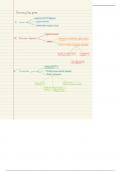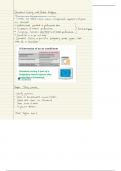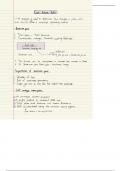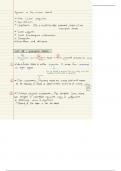Kevinlondeka
On this page, you find all documents, package deals, and flashcards offered by seller kevinlondeka.
- 6
- 0
- 0
Community
- Followers
- Following
6 items

Summary Mind Map for Revenue IFRS 15
IFRS 15 Revenue Recognition Formulae Sheet provides a concise guide to the key steps and calculations for recognizing revenue under IFRS 15, including: Five-Step Model: Identify the contract. Identify performance obligations. Determine the transaction price. Allocate the transaction price to obligations. Recognize revenue when obligations are satisfied. Variable Consideration: Calculate using the expected value or most likely amount method. Revenue Over Time: Use percentage of comple...
- Summary
- • 2 pages •
IFRS 15 Revenue Recognition Formulae Sheet provides a concise guide to the key steps and calculations for recognizing revenue under IFRS 15, including: Five-Step Model: Identify the contract. Identify performance obligations. Determine the transaction price. Allocate the transaction price to obligations. Recognize revenue when obligations are satisfied. Variable Consideration: Calculate using the expected value or most likely amount method. Revenue Over Time: Use percentage of comple...

Revenue IFRS 15
IFRS 15 Revenue Recognition Formulae Sheet provides a concise guide to the key steps and calculations for recognizing revenue under IFRS 15, including: Five-Step Model: Identify the contract. Identify performance obligations. Determine the transaction price. Allocate the transaction price to obligations. Recognize revenue when obligations are satisfied. Variable Consideration: Calculate using the expected value or most likely amount method. Revenue Over Time: Use percentage of comple...
- Summary
- • 14 pages •
IFRS 15 Revenue Recognition Formulae Sheet provides a concise guide to the key steps and calculations for recognizing revenue under IFRS 15, including: Five-Step Model: Identify the contract. Identify performance obligations. Determine the transaction price. Allocate the transaction price to obligations. Recognize revenue when obligations are satisfied. Variable Consideration: Calculate using the expected value or most likely amount method. Revenue Over Time: Use percentage of comple...

Cost volume profit formula
Contribution Margin (CM) per Unit: C M = Selling Price per Unit − Variable Cost per Unit CM=Selling Price per Unit−Variable Cost per Unit Contribution Margin Ratio (CMR): C M R = Contribution Margin per Unit Selling Price per Unit CMR= Selling Price per Unit Contribution Margin per Unit Break-even Point in Units: Break-even Units = Fixed Costs Contribution Margin per Unit Break-even Units= Contribution Margin per Unit Fixed...
- Summary
- • 1 pages •
Contribution Margin (CM) per Unit: C M = Selling Price per Unit − Variable Cost per Unit CM=Selling Price per Unit−Variable Cost per Unit Contribution Margin Ratio (CMR): C M R = Contribution Margin per Unit Selling Price per Unit CMR= Selling Price per Unit Contribution Margin per Unit Break-even Point in Units: Break-even Units = Fixed Costs Contribution Margin per Unit Break-even Units= Contribution Margin per Unit Fixed...

Standard Costing Summary
Definition of standard costing: Explaining what standard costs are and their role in budgeting and cost control. Types of standards: Overview of ideal vs. attainable standards. Setting standards: How to establish direct material, direct labor, and overhead standards. Variance analysis: Explaining price, quantity, labor, and overhead variances, including formulas for calculating each. Favorable vs. unfavorable variances: Interpreting the meaning of variances and their impact on financial perf...
- Summary
- • 7 pages •
Definition of standard costing: Explaining what standard costs are and their role in budgeting and cost control. Types of standards: Overview of ideal vs. attainable standards. Setting standards: How to establish direct material, direct labor, and overhead standards. Variance analysis: Explaining price, quantity, labor, and overhead variances, including formulas for calculating each. Favorable vs. unfavorable variances: Interpreting the meaning of variances and their impact on financial perf...

Cost-Volume-Profit Summary
Fixed and variable costs: Definitions and examples. Contribution margin: Calculating and interpreting the contribution margin per unit and ratio. Break-even analysis: Finding the break-even point in units and dollars. Target profit analysis: How to calculate the required sales volume to meet a profit target. Margin of safety: Understanding how far sales can drop before the company reaches its break-even point. CVP assumptions and limitations: Simplifications made when applying CVP analysis....
- Summary
- • 9 pages •
Fixed and variable costs: Definitions and examples. Contribution margin: Calculating and interpreting the contribution margin per unit and ratio. Break-even analysis: Finding the break-even point in units and dollars. Target profit analysis: How to calculate the required sales volume to meet a profit target. Margin of safety: Understanding how far sales can drop before the company reaches its break-even point. CVP assumptions and limitations: Simplifications made when applying CVP analysis....

IAS 38 - Intangible Assets
Perfect for accounting professionals, students, and anyone keen on mastering International Accounting Standard 38, these notes provide a personal touch to understanding the intricacies of intangible asset accounting. Delve into detailed explanations, practical examples, and insightful interpretations, all presented in a clear and engaging handwritten style. Whether you're studying, practicing, or refining your knowledge, these notes offer a unique perspective to grasp the nuances of financial r...
- Summary
- • 7 pages •
Perfect for accounting professionals, students, and anyone keen on mastering International Accounting Standard 38, these notes provide a personal touch to understanding the intricacies of intangible asset accounting. Delve into detailed explanations, practical examples, and insightful interpretations, all presented in a clear and engaging handwritten style. Whether you're studying, practicing, or refining your knowledge, these notes offer a unique perspective to grasp the nuances of financial r...
